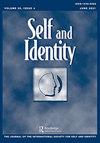Radicalized Identity Styles: Investigating Sociocultural Challenges, Identity Styles, and Extremism
IF 2.1
4区 心理学
Q3 PSYCHOLOGY, SOCIAL
引用次数: 0
Abstract
ABSTRACT Research has identified sociocultural challenges (life attachment) to be a primary motivator for radicalization. While individual differences may provide information about who might be at risk for radicalization, little is known about how different identity processing styles are linked with radicalization. In two studies (N = 975), we examined how identity styles can moderate the association between life attachment and various aspects of extremism. We found that insecure life attachment was significantly and positively associated with radicalization, and this association was strengthened by the normative and the diffuse-avoidant identity style. Results are discussed in relation to identity processes in late modernity, suggesting that personal identity development may emerge as an important factor in the multifaceted process of radicalization.激进的身份风格:调查社会文化挑战、身份风格和极端主义
研究已经确定社会文化挑战(生活依恋)是激进化的主要动机。虽然个体差异可能提供了哪些人可能面临激进化风险的信息,但人们对不同的身份处理方式与激进化之间的关系知之甚少。在两项研究中(N = 975),我们研究了身份风格如何调节生活依恋与极端主义各方面之间的联系。研究发现,不安全生活依恋与激进化显著正相关,而规范性和扩散回避型身份风格强化了这种关联。研究结果与晚期现代性的身份过程有关,表明个人身份的发展可能在激进化的多方面过程中成为一个重要因素。
本文章由计算机程序翻译,如有差异,请以英文原文为准。
求助全文
约1分钟内获得全文
求助全文
来源期刊

Self and Identity
PSYCHOLOGY, SOCIAL-
CiteScore
5.10
自引率
5.00%
发文量
26
期刊介绍:
Work on self and identity has a special place in the study of human nature, as self-concerns are arguably at the center of individuals" striving for well-being and for making sense of one"s life. Life goals develop and are influenced by one"s view of what one is like, the way one would ideally like to be (or would like to avoid being), as well as one"s perceptions of what is feasible. Furthermore, conceptions of self and the world affect how one"s progress towards these goals is monitored, evaluated, redirected, re-evaluated, and pursued again. Thus, the “self” as a construct has far-reaching implications for behavior, self-esteem, motivation, experience of emotions and the world more broadly, and hence for interpersonal relationships, society, and culture.
 求助内容:
求助内容: 应助结果提醒方式:
应助结果提醒方式:


